5min QuickVid: Bjarne Stroustrup on "What inspired you to create C++?"

Bjarne Stroustrup on Creating Code for Everyone
Stroustrup takes five minutes to answer:
- What inspired you to create C++?
- What makes C++ such a widely used language?
March 11-13, Online
March 16-18, Madrid, Spain
March 23-28, Croydon, London, UK
March 30, Kortrijk, Belgium
May 4-8, Aspen, CO, USA
May 4-8, Toronto, Canada
June 8 to 13, Brno, Czechia
June 17-20, Folkestone, UK
September 12-18, Aurora, CO, USA
November 6-8, Berlin, Germany
November 16-21, Búzios, Rio De Janeiro, Brazil
By Blog Staff | Dec 14, 2012 10:54 AM | Tags: None

Bjarne Stroustrup on Creating Code for Everyone
Stroustrup takes five minutes to answer:
- What inspired you to create C++?
- What makes C++ such a widely used language?
By Bartosz Bielecki | Dec 13, 2012 10:51 AM | Tags: advanced
[Ed.: Many thanks to reader Bartosz Bielecki for directing our attention to a good resource for all the performance tweak-heads out there. You know who you are.]
Agner Fog's C++ Optimization Manuals
submitted by Bartosz Bielecki
Agner Fog's site is one of the most important pages related to software optimization (also for the C++). You will find following guides there:
- C++ optimization,
- assembly optimization,
- CPU instructions choice,
- C++ calling conventions,
- and various other links/tools.
If you have not been there, it is high time you did it!
By Eric Niebler | Dec 13, 2012 10:50 AM | Tags: advanced
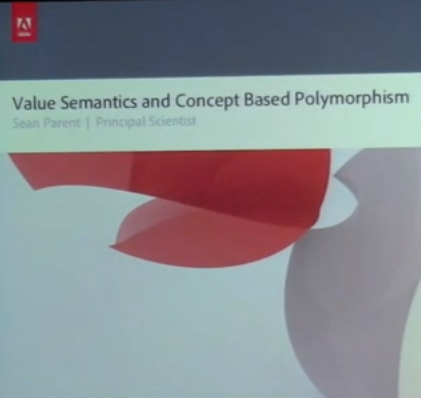
Value Semantics and Concepts-Based Polymorphism
by Sean Parent
Sean will further develop the Value Semantics and Concepts-based Polymorphism concepts covered in his keynote, "Now What? A vignette in 3 parts."
Note: The audio is soft. Turn your volume up. The slides, the Keynote presentation, and the source code can be found in C++Now's GitHub repo here.
By Blog Staff | Dec 12, 2012 02:07 PM | Tags: None
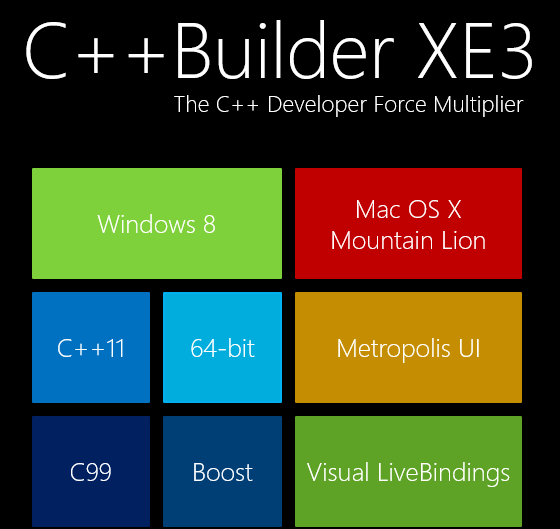
From the product announcement:
C++Builder XE3 delivers the best of both worlds – a highly-compliant C++11 64-bit Windows toolchain with an agile development solution. Now you can use the latest C++ features and libraries while you speed your development process with C++Builder’s visual development environment.
With C++Builder XE3, developers can use Embarcadero C++ standard extensions to provide an agile coding experience with rapid prototyping and reusable software components, and a fully integrated two-way visual development environment so you can deliver your applications to market faster.
- New 64-bit Windows compiler based on a multi-device targeting architecture
- C++98, C++TR1, and C++11 language standards
- ANSI C, ISO C, C99, and C11 language standards
- Dinkumware STL 5.3 and Boost 1.5
- CLANG compatible
- Agile C++ language extensions
- Cross-compilation to multiple Windows and Mac OS X platforms (iOS and Android coming in 2013)
By Blog Staff | Dec 12, 2012 11:41 AM | Tags: None
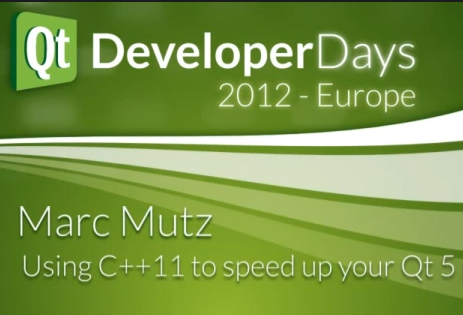
Using C++11 to Speed Up Your Qt 5 Programs (PDF slides)
Marc Mutz
Qt 5 comes with much-improved support for C++11. This talk will teach you techniques that you can use to make your applications use less memory or execute faster when compiled with a C++11 compiler. The focus is on techniques that will not break compatibility with C++98 compilers. After a look at the present state of C++11 support in Qt 5.0, the talk closes with a look at what we can expect in Qt 5.1.
From the summary slide "C++11 @ QT 5.0":
constexpradded to many types- move semantics added to a few types
initializer_listadded to most types- new few N-ary ctors marked
explicit, N >= 2= deleteused almost ubiquitouslynoexceptadded in a few central places
By Blog Staff | Dec 11, 2012 05:08 PM | Tags: intermediate
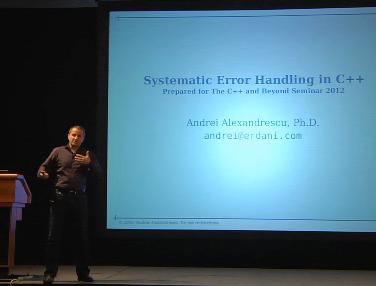
Systematic Error Handling in C++11
Andrei Alexandrescu
Writing code that is resilient upon errors (API failures, exceptions, invalid memory access, and more) has always been a pain point in all languages. This being still largely an unsolved (and actually rather loosely-defined) problem, C++11 makes no claim of having solved it. However, C++11 is a more expressive language, and as always more expressive features can be put to good use toward devising better error-safe idioms and libraries.
This talk is a thorough visit through error resilience and how to achieve it in C++11. After a working definition, we go through a number of approaches and techniques, starting from the simplest and going all the way to file systems, storage with different performance and error profiles (think HDD vs. RAID vs. Flash vs. NAS), and more. As always, scaling up from in-process to inter-process to cross-machine to cross-datacenter entails different notions of correctness and resilience and different ways of achieving such.
To quote a classic, "one more thing"! An old acquaintance -- ScopeGuard -- will be present, with the note that ScopeGuard11 is much better (and much faster) than its former self.
By Eric Niebler | Dec 11, 2012 09:52 AM | Tags: None
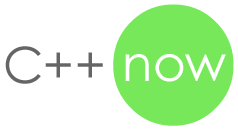
Registration for C++Now 2013 Is Now Open!
The seventh annual C++Now Conference (formerly BoostCon) will be held at the Aspen Center for Physics in Aspen, Colorado, May 12th to 17th, 2013.
"We are thrilled to announce the second annual C++Now conference, the whole-language edition of BoostCon covering all the coolest topics in C++," said Dave Abrahams, Conference Co-Chair. "In 2012, we broadened the conference scope by adding a third track and offering more C++11 coverage than any other event, and the community responded with an unprecedented number of registrations. In 2013, we are going to build on that success with foundational sessions integrating what we've all learned about using C++11 during the past year, while continuing the exploration of cutting-edge topics that BoostCon attendees have come to expect."
Read the full announcement for the registration deadlines and a special call for volunteers, who get their registration fees waived.
By Marco Arena | Dec 10, 2012 01:27 PM | Tags: advanced
 Use CRTP for Polymorphic Chaining
Use CRTP for Polymorphic Chainingby Marco Arena
This suggested video reminded me another use of CRTP I described some months ago. It was about how to support method chaining when inheritance is involved.
Consider this simple scenario:
struct Printer
{
Printer(ostream& stream) : m_stream(stream) {}
template<typename T>
Printer& println(T&& message)
{
cout << message << endl;
return *this;
}
protected:
ostream& m_stream;
};
struct CoutPrinter : public Printer
{
CoutPrinter() : Printer(cout) {}
CoutPrinter& color(Color c)
{
// change console color
return *this;
}
}
//...
CoutPrinter printer;
printer.color(red).println("Hello").color( // OOPS
println("Hello") returns a Printer& and not a CoutPrinter&, so color is no longer available.
In this post I wrote a very simple approach based on CRTP to maintain the chaining relationship when inheritance is involved. I also propose a complicated-at-first-sight way to avoid duplication employing a bit of metaprogramming.
By Herb Sutter | Dec 10, 2012 08:59 AM | Tags: None
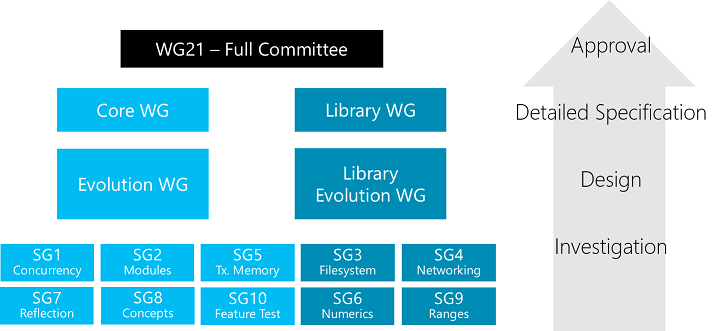 The Committee page has been updated to reflect an organizational change: WG21 has decided to split the Library working group into a core “Library” group (LWG) and a forward-looking “Library Evolution” group (LEWG), following the model of how the language side is split between “core” and “evolution.”
The Committee page has been updated to reflect an organizational change: WG21 has decided to split the Library working group into a core “Library” group (LWG) and a forward-looking “Library Evolution” group (LEWG), following the model of how the language side is split between “core” and “evolution.”
Summary:
Thank you to Beman for his volunteering to lead Library Evolution, and to Alisdair for his continued excellent efforts leading Library! It’s hard work, and much appreciated.
By Blog Staff | Dec 7, 2012 11:05 AM | Tags: None
 Reminder: On Monday morning in California (find your local time), the free online CodeRage 7 conference will kick off with a special inverview with Bjarne Stroustrup.
Reminder: On Monday morning in California (find your local time), the free online CodeRage 7 conference will kick off with a special inverview with Bjarne Stroustrup.
Note that registration is free but required -- you need to register in order to get information on how to access the live GoToWebcast event.
SPECIAL SESSION: A C++ Conversation with Bjarne Stroustrup
Bjarne Stroustrup and David Intersimone
Monday, December 10th - 8:00am - 8:45am PST (find your local time)
Bjarne Stroustrup will discuss the ISO C++11 standard, new language features, how C++11 builds on C++’s strengths, application portability, and C++’s ubiquitous presence in the markets.
Session Full?
We anticipate a very large audience for this special session. In the event that the conference GoToWebinar session becomes full during this session, you may use the following link to listen to the audio stream:
AUDIO ONLY OVERFLOW - https://www3.gotomeeting.com/register/692238398